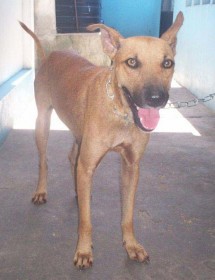Continued
Last week, we mentioned those important factors which influence the well-being of the older dog. Now, although we can’t prevent ageing, we must carry out a care and treatment regime that will slow down this inevitable and irreversible event.

Within the context of alleviating physical and emotional stress (yes, dogs have emotions too), we must ensure that the pet has a thorough physical examination at least annually, preferably every six months, after the dog’s birth. Of course, the veterinarian does see the puppy at 3 weeks of age (for the first deworming), and then later at 6, 9, 12 and 16 weeks of age, when the animal comes in for vaccinations and dewormings.
These visits to your veterinarian would entail examinations primarily of the cardiac (heart), pulmonary (lungs), urinary (kidneys), and reproductive systems. Blood, urine and stool samples can be taken and analyzed in the laboratory. These results can give us an inkling of any present and potential ailment. There are several lab tests available which can assess the functions of organs such as the liver, kidneys, heart, etc. Radiographs (X-rays) can be taken, as well as blood pressure tests and ECGs can be performed.
During these half-yearly examinations, your vet can try to deal with any ailments which are just beginning, and even those maladies that have become relatively chronic (long standing). It is always good when we nip an ailment in the bud, before it gets worse – even life threatening.
Sometimes a simple surgical intervention is indicated and can remove a potentially serious ailment. Cleaning of the teeth (getting rid of tartar and other dental deposits) and the removal of growths and cataracts immediately spring to mind. Of course there is a whole plethora of medicines (heart tablets, vitamins, enzymes, hormones) which can relieve discomfort and enhance organ performance in the elderly dog. Your vet can advise you.

Changes in the older dog
I mentioned above that dogs have emotions too. Every dog owner knows that dogs show signs of envy, aggression, hate, cowardice, curiosity, happiness (I have a friend who swears that dogs smile) excitement, love, suspicion, jealousy, and so on. As dogs get older, they – like people – get mature and more self-confident. As a result, they don’t exhibit at once and quickly some of the reactions that they might have shown when they were younger.
They undergo distinct behavioural changes as they become elderly. They are more lethargic and much less curious. They display a lot of self-confidence and therefore are more complacent and better balanced. I should mention also – like their human counterparts (don’t I know it) – dogs become forgetful with age.
One of the most noticeable of behavioural changes occurs in the realm of their sexuality. Elderly dogs don’t go around constantly raising their hind legs and marking their territory. When the younger bulls go chasing bitches in heat, the elderly dog is quite content to take a sniff and let it be. Seldom will he engage in a fight for a mate. Some of these psychological changes are, of course, a result of straight physical decline.
Next week, we’ll discuss some distinct physical changes in the elderly dog. Until then, please vaccinate your young puppies before they get infected with any of the many diseases waiting to kill them.
Please implement disease preventative measures (vaccinations, routine dewormings, monthly anti-heartworm medication, etc) and adopt-a-pet from the GSPCA’s Animal Clinic and Shelter at Robb Street and Orange Walk, if you have the wherewithal to care well for the animals. Do not stray your unwanted pets, take them to the GSPCA’s Clinic and Shelter instead. If you do not wish your pet to have puppies or kittens, you may exploit the GSPCA’s free spay and neutering programme. If you see anyone being cruel to an animal, or if you need any technical information, please get in touch with the Clinic and Shelter by calling 226-4237.



